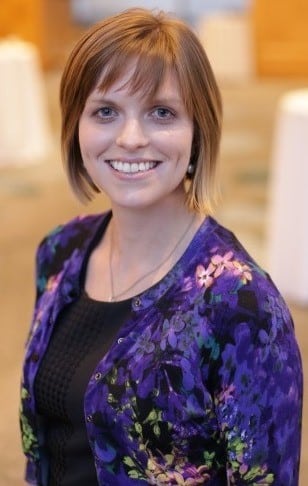
Laura Banks
Laura Banks first became involved with the Canadian Cardiovascular Society (CCS) while completing her PhD. Eager to connect to the cardiovascular community, she attended the Canadian Cardiovascular Congress (CCC), signing up for the Annual Cardiovascular Trainee Day and presenting some of her clinical research findings to a captive audience.
Today, Laura Banks is an Assistant Teaching Professor at Ontario Tech University and an Affiliate Scientist with the University Health Network (UHN). She is also an active CCS member who has developed a passion for bringing broader female representation to cardiovascular medicine and science.
One example is her research in gender equity which has been published in multiple Canadian Journal of Cardiology (CJC) articles.
“We know that females are largely underrepresented when it comes to being recognized for academic excellence and gaining leadership positions within the cardiovascular domain,” she says.
Her awareness of the disparity was heightened early on in her career when she accepted the role of CCS Trainee Day Program Committee Co-Chair.
“When we were looking to develop a curriculum, I noticed that the majority of speakers that had been chosen for Trainee Day were in fact male, and yet, our committee and the trainees attending those sessions or workshops, were approximately 50% female,” she explains.
Over the next several years, she has collaborated with colleagues to increase diversity in the Trainee Day Program.
The CCS Scientific Program Committee Chair has increasingly been aware of equitable representation with a commitment to a 3G philosophy to promote greater gender, geography, and generational representation. In fact, a growing number of medical experts won’t join a panel session if it doesn’t have a balance of women and men.
According to a CJC article she co-authored, “Women remain vastly underrepresented in cardiovascular medicine and science in Canada. As of 2017, 9% of established cardiac surgeons and 20% of newly certified cardiac surgery fellows are women. Likewise, 22% of adult cardiologists and 44% of pediatric cardiologists are women, respectively improving to 34% and 64% for newly minted specialists.”
The results may be disheartening to some, but there are steps that can be taken to further support women in cardiology, cardiac science, and medicine. Banks was also involved in research to pinpoint the factors that contributed to the success of female early-career faculty. She and her colleagues found that the number one factor participants attributed to their own success was mentorship.
“Our research examining trainees and early career professionals in the Canadian cardiovascular landscape has consistently revealed the importance of mentorship in career development and advancement,” says Banks. “As individuals who are part of a professional society, we must strive for equity, diversity, and inclusion, and this relies on strong mentorship and sponsorship.”
For its part, the CCS is working towards addressing this issue through new programs like the Trainee Networking event, where trainees are matched with mentors.
Laura continues to be actively involved in the CCS for two reasons. “Firstly, it provides an opportunity for me to promote and advocate for training programming at the CCS, making sure that trainees have a seat at the table when it comes to being involved in the planning of various committees. Second, it provides a unique opportunity to form collaborations with leading cardiovascular experts from across Canada.”
Note: Laura Banks is an Assistant Teaching Professor at Ontario Tech University, and an Affiliate Scientist at the Toronto Rehabilitation Institute, in their Cardiovascular Prevention and Rehabilitation Program, part of the University Health Network.
